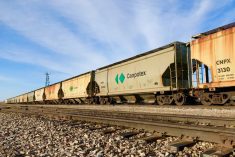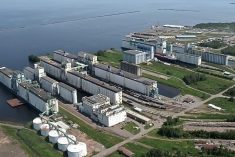Frankfurt | Reuters –– Shares in German potash miner K+S leapt as much as 40 per cent on Friday after a takeover proposal from Canada’s PotashCorp, which sources close to the matter said was worth close to eight billion euros (C$11 billion).
K+S, which would become the first German blue-chip firm in a decade to be bought by a foreign company, said it was “assessing the available options” after announcing PotashCorp’s “written proposal… for the acquisition of all shares” on Thursday.
Neither K+S nor PotashCorp put a dollar amount to the proposal in their brief statements confirming the proposal, but two sources close to the matter said K+S would likely reject the proposal as too low.
Read Also

USDA adjusts supply/demand estimates
Corn and soybean yields in the United States were left unchanged in the latest supply/demand estimates from the U.S. Department of Agriculture, released July 11, although a reduction in harvested area led to small downward revisions to production for the crops.
K+S believes Potash wants to take capacity out of an oversupplied market to boost profitability, the sources said, adding it might close some of K+S’s high-cost German mines and sell its salt business.
Saskatoon-based PotashCorp is operating well below full capacity because of weak prices for potash, which is mostly used in fertilizers.
Both companies declined comment on Friday.
One of the sources said PotashCorp proposed to pay 41 euros (C$56.40) a share, a 41 per cent premium to K+S’s closing price on Thursday and 43 per cent above the weighted six-month moving average price, according to Thomson Reuters data.
K+S shares rose 30 per cent to close at 37.66 euros, after touching a three-year high of 40.285. Potash shares were down 2.4 per cent in Toronto and New York in early afternoon.
K+S is the world’s fourth-largest potash maker, trailing the North American export pact Canpotex made up of Potash, Mosaic Co. and Agrium, as well as Uralkali and Belaruskali.
A deal with PotashCorp would be the first big global potash merger since Uralkali bought Silvinit in 2011.
PotashCorp’s bid is the latest move by a North American company on a European rival, as U.S. and Canadian firms take advantage of low interest rates and a weak euro.
U.S. seeds company Monsanto is trying to buy Swiss peer Syngenta, while in retail, Saks owner Hudson’s Bay Co. agreed this month to buy German department store chain Kaufhof.
Oversupply
Bernstein analysts said Potash was probably attracted by the two million-tonne Legacy potash mine, which K+S is constructing at Bethune, Sask., northeast of Moose Jaw.
“An acquisition could prevent K+S’s Legacy from becoming a market price spoiler as it adds capacity to already over-supplied global and North American markets,” they said in a note.
Citigroup analyst Andrew Benson agreed, saying Potash could shut some of K+S’s high-cost capacity in Europe.
Others questioned the proposal’s rationale and said it would likely face stiff resistance.
The premier of the German state of Hesse, where K+S is headquartered, said local jobs must not be threatened.
One of the sources said the proposed offer did not reflect the value of the Legacy project. K+S has spent two billion euros on the mine, which is now 75 per cent completed.
The proposal is PotashCorp’s second tilt at K+S. A bid to acquire a majority stake in 1997 was blocked by Germany’s competition watchdog.
The sources said, however, that antitrust hurdles would play a lesser role this time.
In 2010, PotashCorp itself was the target of a US$39 billion hostile bid from mining company BHP Billiton, but that deal was foiled by the Canadian government.
Fears of a second approach by BHP may be behind Potash’s attempt to bulk up, said John Goldsmith, vice-president of Potash shareholder Montrusco Bolton, which bought additional shares on Thursday.
“When one of the lowest-cost producers is buying a higher-cost producer, it doesn’t make a lot of sense,” he said. “Ultimately, this is possibly a way to stave off a second BHP bid.”
The once-tight global potash market has become over-supplied, while competition has heated up since Uralkali and Belaruskali stopped selling potash together in 2013.
— Arno Schuetze and Ludwig Burger report for Reuters from Frankfurt. Additional reporting for Reuters by Rod Nickel in Winnipeg and Euan Rocha in Toronto.




















